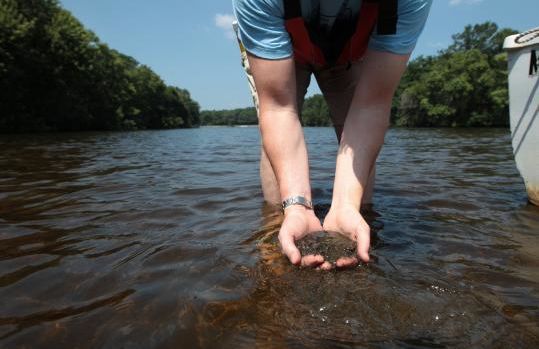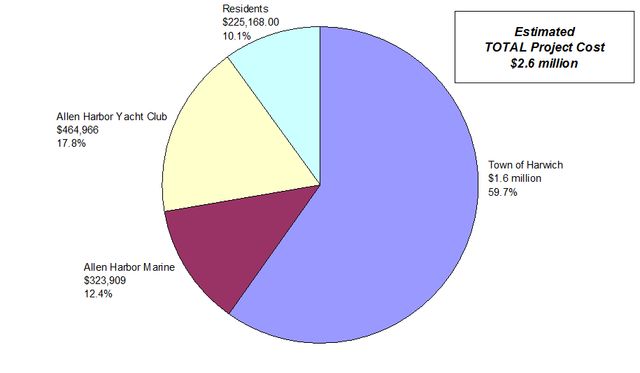

Cape Cod is blessed with many natural harbors, channels, and estuaries that offer access to Nantucket Sound and Cape Cod Bay. Within the watershed of these waterways live abundant fish and plant life. At the end of the aquatic life cycle of plants and fish, their remains break down and settle to the bottom. This naturally-occurring, organic material is called silt. While silt levels can fluctuate seasonally and with tidal flow, at some point, the amount of silt can become excessive, affecting the ecological health of the environment and hindering safe boat navigation.

While silt levels can fluctuate seasonally and with tidal flow, at some point, the amount of silt can become excessive, affecting the ecological health of the environment and hindering safe boat navigation. Photo: Boston Globe
Silt accumulates on a continual basis with the natural break down of organic matter. As organic matter settles to the bottom, it gives off nitrogen, which in turn encourages invasive growth of vegetation. Fluctuating nitrogen levels in the water have a direct effect on silt production. As the level of nitrogen increases, it creates an environment conducive to algae growth. When algae blooms dies, it becomes part of the silt material. Nitrogen introduced into the water, whether naturally or via septic system effluent or lawn run off from nitrogen-rich fertilizer, encourages algae blooms, and results in degradation of the water quality through a process known as “eutrophication”, and the effect will be higher and higher amounts of silt in the water.
Eutrophication - an increase in the concentration of phosphorus, nitrogen, and other plant nutrients in an aging, aquatic ecosystem that results in an increase in organic material. The organic material breaks down, enters the ecosystem, and results in large concentrations of blooms of algae and microscopic organisms on the water surface.
Some say let nature take its course while others vie for strong intervention in managing waterways. Midway between these two viewpoints lies the most tenable option - periodic dredging to deepen waterways and, when possible, use the removed organic sediment in an environmentally-responsible way, such as part of a beach stabilization or a beneficial re-use effort.
Dredging inner harbors is defined as removing accumulated underwater silt. It is a labor and time intensive undertaking that requires manpower, state-of-the-art equipment, precise timing, and knowledge of the dredging process.

The Town of Harwich engaged the services of Coastal Engineering to develop a town-wide Harbor Management Plan.
Allen Harbor is a manmade basin that was created in 1926. The Town of Harwich and commercial property owners on the harbor depend on the harbor’s safe navigation to meet the boating public’s needs. Since the harbor’s inception, there had been limited localized dredging. Prior to the 2012 town effort, last major dredging of the inner basin took place in 1952. The harbor was unsafe to navigate in some areas. Private and commercial boat owners ran their engines a foul through the silt. The silt got churned up and settled anew, resulting in a limiting depth of only 3-4 feet at low tide.
Residents along the harbor needed to maintain the waterway to preserve deep-water boating access, and the public wanted to protect water quality and the ecological environs around the waterway.
The Town engaged the services of Coastal Engineering to develop a town-wide Harbor Management Plan. A feasibility study addressing the dredging of Allen Harbor was performed, along with consultations and recommendations to the Town on long-term financial planning and budgeting for ongoing dredge maintenance. For three years, the Town of Harwich had worked diligently to get regulatory approvals to dredge and subsequently dispose of the dredge spoils taken from Allen Harbor, and to gain support from the town to share in the cost of this betterment project. Eventually, the residents of Harwich approved a $2.6 million, 10-year debt exclusion to dredge Allen Harbor. That cost is shared among the Town of Harwich, businesses surrounding the harbor, and abutting residents. The dredging effort was undertaken in tandem with a town-wide beach nourishment plan to help ensure the economic and environmental future of the Town’s important harbor and beach resources.

The Town of Harwich has illustrated the power of a cooperative public- private endeavor and may serve as a model for other Cape towns whose harbors are in jeopardy. The stakeholders in the Allen Harbor dredging project realized the importance of returning Allen Harbor to a healthy state. Concerned taxpayers, business owners, and residents came together to work toward a common goal. In doing so, they have engineered a positive outcome for Allen Harbor.
But suppose no intervention was made. How would Allen Harbor evolve if it were not dredged?
Predictions are that the harbor would continue to fill in with silt, stifling water quality and rapidly degrading environmental conditions. Boats would operate in unfavorable, silty conditions restricting access during full tide cycles. Commercial fishermen, who depend on safe passage in and out of the harbor, would not be able to enter the harbor to dock, and their livelihoods could be jeopardized. Vessel owners, no longer able to navigate the channel nor use the Town Boat Ramp, would need to dock elsewhere or in other towns if their boating time were dictated by limited deep water mobility.
The loss of a harbor has a trickle-down financial effect to other business and economic interests in the town as well, affecting retailers, restaurants, and lodging businesses.
Waterfront homeowners invest in premier real estate because of location and because of reliable deep-water access for boating. If not maintained, a channel and harbor can fill in and eliminate that access for boating. As a result, property values may be adversely affected by as much as 70% if the property goes from dock waterfront to swamp marsh.
Environmentally speaking, deferred maintenance of a harbor may have undesired consequences. Decades of settling sediment result in:
Eventually the harbor would revert to a marsh. A productive waterway for boaters and aquatic life would be lost.
Dredging is a proactive and environmentally responsible method of nurturing and protecting Cape Cod's waterways. The benefits of dredging include returning a waterway to a healthy ecological state; preserving an economic asset for the Town; and securing the boating public's safety. The cost to dredge can be quantified, budgeted for, and managed over the long term.
In contrast, the decision not to dredge carries a risk of harming aquatic fish and plant species, losing precious waterways, negatively impacting Town revenue, and completely altering our marine landscape - an environmental and financial price tag that is too expensive for Cape Cod.
Coastal Engineering Co. offers dredge design and harbor management planning services. Contact us and we’ll be happy to discuss the work plan with you!